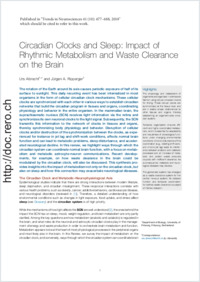Circadian clocks and sleep: impact of rhythmic metabolism and waste clearance on the brain
- Albrecht, Urs Department of Biology, University of Fribourg, Switzerland
- Ripperger, Jürgen A. Department of Biology, University of Fribourg, Switzerland
-
01.10.2018
Published in:
- Trends in Neurosciences. - 2018, vol. 41, no. 10, p. 677–688
English
The rotation of the Earth around its axis causes periodic exposure of half of its surface to sunlight. This daily recurring event has been internalized in most organisms in the form of cellular circadian clock mechanisms. These cellular clocks are synchronized with each other in various ways to establish circadian networks that build the circadian program in tissues and organs, coordinating physiology and behavior in the entire organism. In the mammalian brain, the suprachiasmatic nucleus (SCN) receives light information via the retina and synchronizes its own neuronal clocks to the light signal. Subsequently, the SCN transmits this information to the network of clocks in tissues and organs, thereby synchronizing body physiology and behavior. Disruption of cellular clocks and/or destruction of the synchronization between the clocks, as experienced for instance in jet lag and shift-work conditions, affects normal brain function and can lead to metabolic problems, sleep disturbance, and accelerated neurological decline. In this review, we highlight ways through which the circadian system can coordinate normal brain function, with a focus on metabolism and metabolic astrocyte–neuron communications. Recent developments, for example, on how waste clearance in the brain could be modulated by the circadian clock, will also be discussed. This synthesis provides insights into the impact of metabolism not only on the circadian clock, but also on sleep and how this connection may exacerbate neurological diseases.
- Faculty
- Faculté des sciences et de médecine
- Department
- Département de Biologie
- Language
-
- English
- Classification
- Biological sciences
- License
- License undefined
- Identifiers
-
- RERO DOC 323304
- DOI 10.1016/j.tins.2018.07.007
- Persistent URL
- https://folia.unifr.ch/unifr/documents/307162
Statistics
Document views: 103
File downloads:
- rip_ccs.pdf: 362
